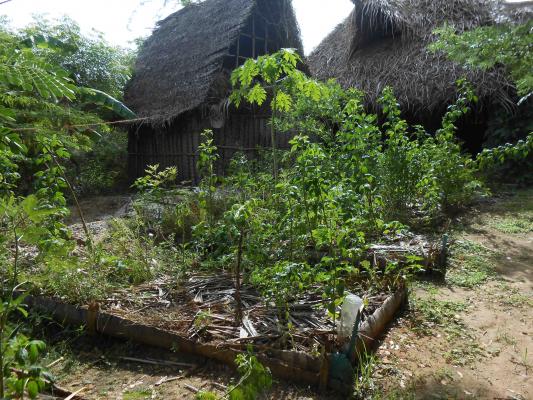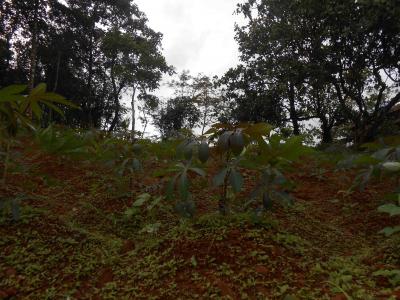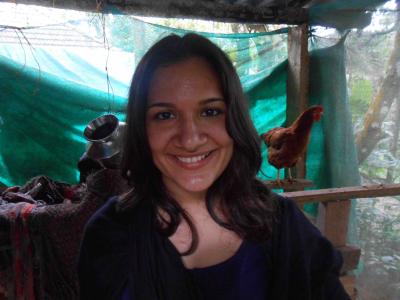
Gardens and natural buildings at Sapney Farm, Heal the Soil, Auroville, Tamil Nadu
The children were giggling and screaming out the names of vegetables, fruits and flowers. It was an intense review game for our weekend English class in the rural community of Wayanad. Jessi, a community member and one of the Spoken English teachers had already chosen a vegetable name which all of us had to guess in order to win the vocabulary game. The children, ages from 4 to 14, were energetically screaming and giggling trying to figure out the right question to ask in English in order to win this intense guessing game. “What color is it?!” “Is it big or small?!!” a girl would laugh and another one will scream again “WHAT COLOR?!!”. We were also laughing trying hard to mentally revisit the words they had been teaching us in Malayalam, the community’s local language. The children had challenged the Profugo Fellows to guess the name of the vegetables in Malayalam before anyone in their 3 groups could say it in English. Needless to say… the students won. They have studied their English vocabulary better than we have our Malayalam word list. Nevertheless, our Profugo team had a great time trying to follow the speedy Malayalam pronunciation of the English word equivalent. The students got so involved in the vocabulary review game that we almost played for the whole class! The Spoken English classes conducted by Jessi and Emily (the other fellow from PA) have been a great success. The classes, now held every Saturday and Sunday, are a great way for us to start getting to know the residents and earn the trust of the community. As the word keeps spreading and the children get more curious of our presence in town the number of new faces grows with every class day. If we continue this attendance rate we will be ready to start planting our school garden in the next couple of weeks! I’m extremely excited to link my agricultural project with the Spoken English class since the children in the community seem very eager to learn and, compared to the adults, the children are less busy and less shy when communicating in English. The idea is to slowly incorporate a gardening curriculum using the Spoken English class as the platform.

A snapshot of the community’s land and its crops.
I look forward to getting the community’s feedback to the kitchen gardening project and I truly hope that this curriculum could lead to some sort of community supported agriculture project in our neighborhood. We have gotten many good ideas for this program from Heal the Soil in our visit to their organization’s Sapney Farm in Auroville, Pondicherry. If time and work allows… we’ll have an even greater chance of learning more from attending their 3 week long comprehensive Permaculture Certification Course offered this February. Permaculture is an approach to designing human settlements and agricultural systems modeled after the relationships found in natural ecologies. In the previous week long visit to Heal the Soil we saw first hand how they used their land as a laboratory and educational model showcasing different permaculture techniques (using local medicinal practices and native food recipes) which they then try to communicate to the local residents by implementing kitchen gardens as the working class residents come home from work on the weekends. In our visit to Pondicherry we had a chance to see three of the many kitchen gardens created by Heal the Soil in the community of Auroville. The idea is to save money while allowing a healthy diet and protecting the environment by recycling natural resources. Many of the gardens use recycled domestic “waste water” from the kitchen and sink. They also have substituted ornamental gardens with practical kitchen gardens making better use of the land with gardens that save the families many rupees a year on food costs. Furthermore, the program also fosters community solidarity as they can barter the different varieties of vegetables among themselves allowing families to have a huge selection and high quality organic vegetables despite only having a little space in their respective small individual family homes.

One of my visits to a residential plant/animal nursery
I’m very excited to see where this idea of a community supported agriculture program growing along with the garden and the English classes. We were also learning lots about many other new initiatives in the field and we look forward to implementing different pilots at some point in our organizational developments. Interested? Keep a lookout for the next blogs to learn more about our visit to Kochi St. Alberts’ College to learn more about hydroponics (growing fish and plants) and to read more on the outcome of the first tailoring workshop assessment.

Leave a Reply
You must be logged in to post a comment.